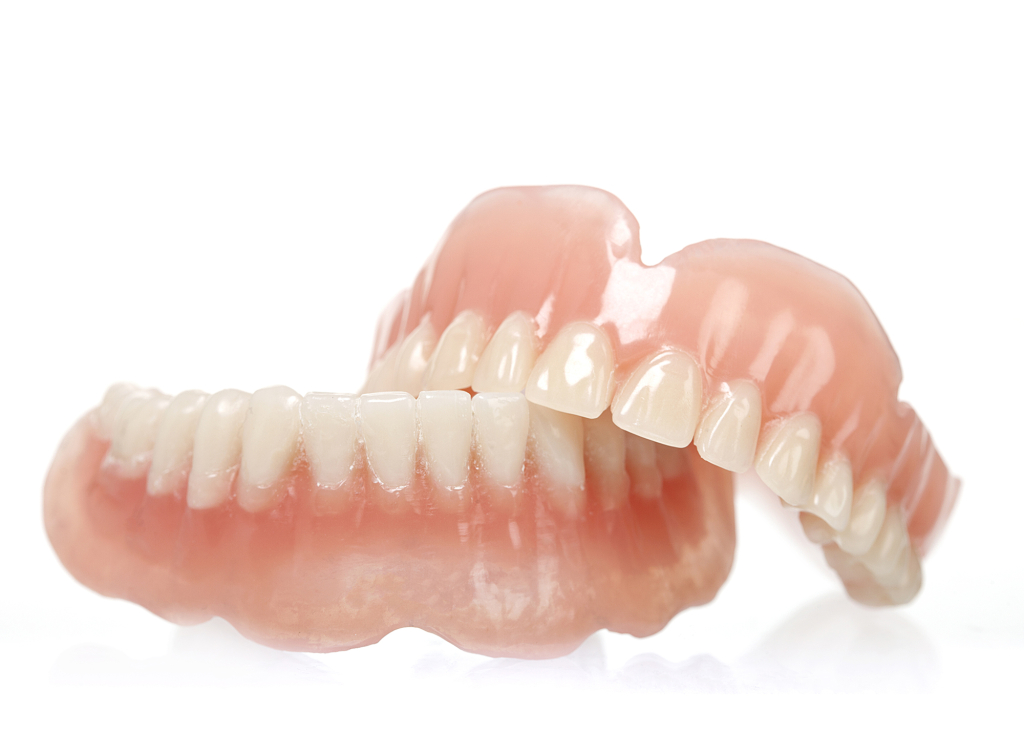Dentures
A basic denture is a removable or fixed appliance for missing teeth and the tissues which are connected with those teeth. Denture is usually made of acrylic plastic, porcelain and metallic material. A denture looks and functions similar to natural teeth.
Dentures can be used by people who have had partial loss of teeth due to age, decay or any other reasons. Dentures give a sense of confidence in people who have missing teeth and also add to their emotional wellbeing.
There are a variety of different types of dentures. Dentures are classed depending on whether or not there are natural teeth remaining in the mouth to support them. Dentures are also classed on the types of material used to make them and how they are held in your mouth. Which type of denture you may need and which material is best can be decided with your dentist.
Denture Categories
Partial Dentures
Partial Dentures are one solution for patients who have one or more naturals missing. Partial dentures can be acrylic (plastic) or metal. Before a partial denture is fitted, any other work (fillings and gum work) that is needed in the mouth is usually carried out first. The teeth that hold the partial denture in place may need to be adjusted or even be crowned. Your denturist examines your remaining teeth and makes sure that he gives you the right design that will work for you. Some of the advantages of Partial Denture are:
- More affordable than implant solutions
- Surgery not necessary
- Restores chewing efficiency
- Maintains proper contact between upper and lower teeth as well as spacing between existing natural teeth
- Helps to prevent malocclusion and temporomandibular joint (TMJ) disorder
Disadvantages include possible impaired speech, possible food getting under the denture, fear of denture falling out and painful sensitivity or sore sports due to moving denture.
Complete Dentures
A complete denture, as the name suggests is a full denture, and is used by people who have lost all of their teeth. These dentures support a full set of teeth which are either made by plastic or porcelain. They therefore rest directly on the gum that overlies the bone in the mouth.
Your denturist takes your impression, sets up your teeth, and finishes your dentures. Benefits of complete dentures include:
- Restoring basic function of eating and chewing
- Improved appearance
- Surgery not necessary
Overdentures
Overdentures can also be implanted permanently. These are usually used by people who have lost all their teeth and find it difficult to chew and eat.
Overdentures have several advantages, which include the following:
- Your own teeth take some of the biting pressure so less pressure is on the gums. Teeth roots are designed to take biting forces, gum tissue is not!
- If done correctly, your remaining teeth may help keep the denture more stable. This can make quite a difference in some cases.
- Maintaining some of your own teeth will mean the bone will be preserved to a degree. This will help keep the gum line stable and there may be less ‘shrinking in’ of the lips and cheeks.
- Some people find dentures more tolerable if they have some teeth remaining underneath. They get more ‘feedback’ when eating and speaking, so the dentures feel more natural and acceptable.
As it is the lower jaw where problems most arise with dentures, it is here where over-dentures may be most beneficial
However you can also have implant-supported removable overdentures.
Immediate Dentures
These are dentures that are fitted immediately after a tooth or several teeth are extracted. They are a temporary denture, used to replace these teeth as the mouth heals. Immediate dentures are constructed before your teeth are extracted and are inserted immediately following the removal of your remaining teeth. This immediate placement protects your mouth’s tissues, minimizes bleeding, promotes healing, and helps you make the transition from natural teeth to dentures smoothly. You don’t have to wait for months without your teeth.



